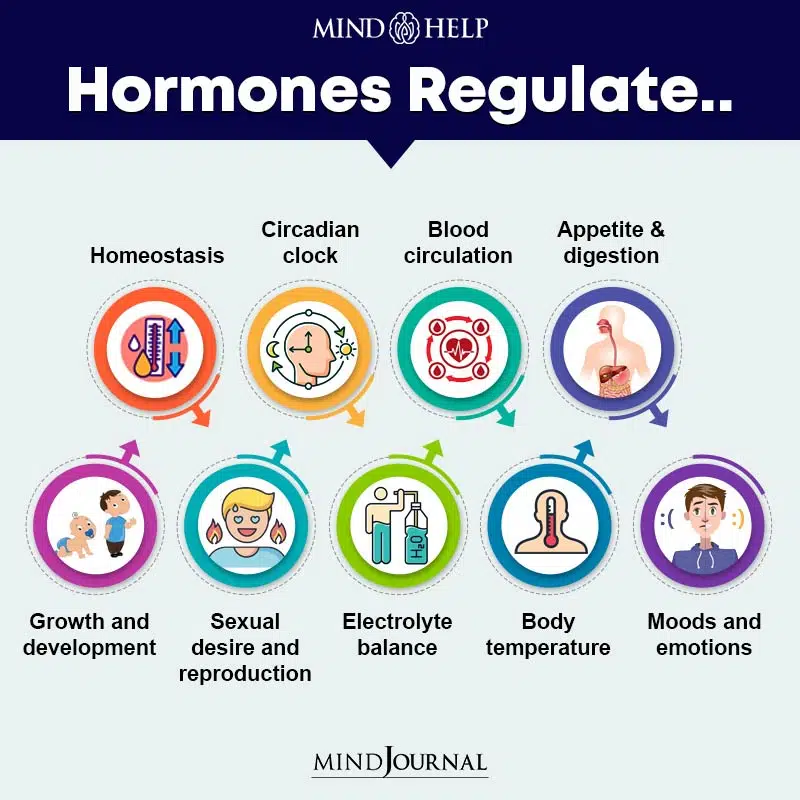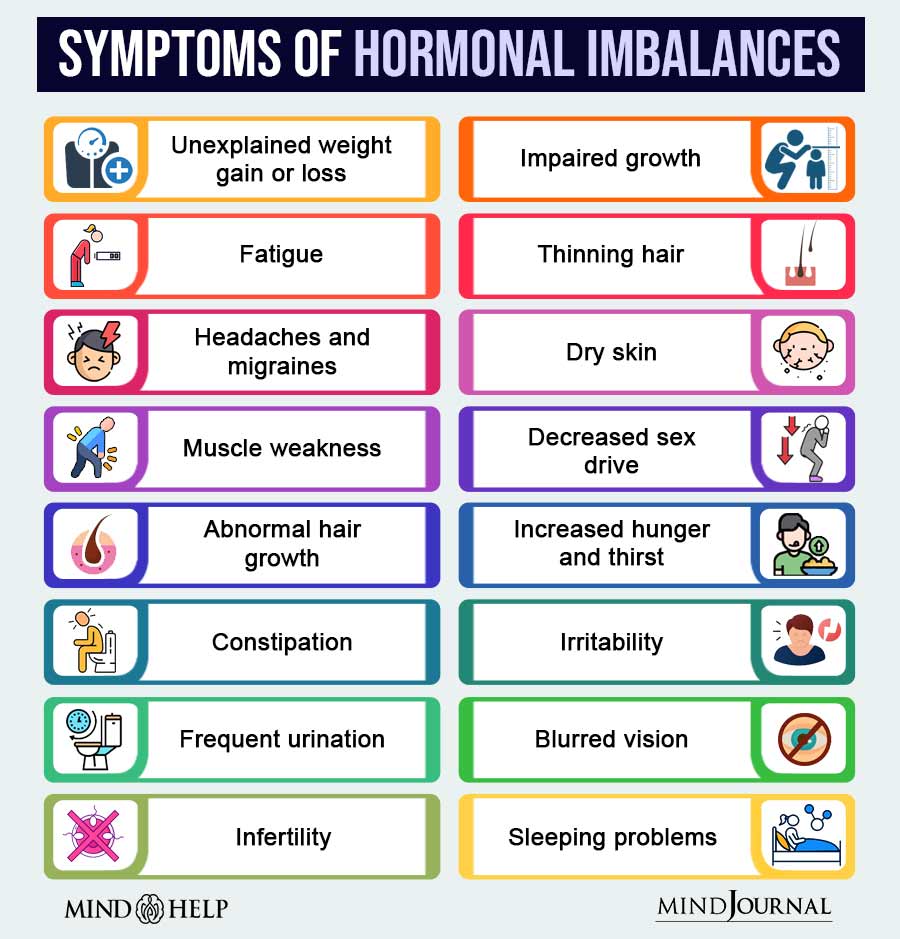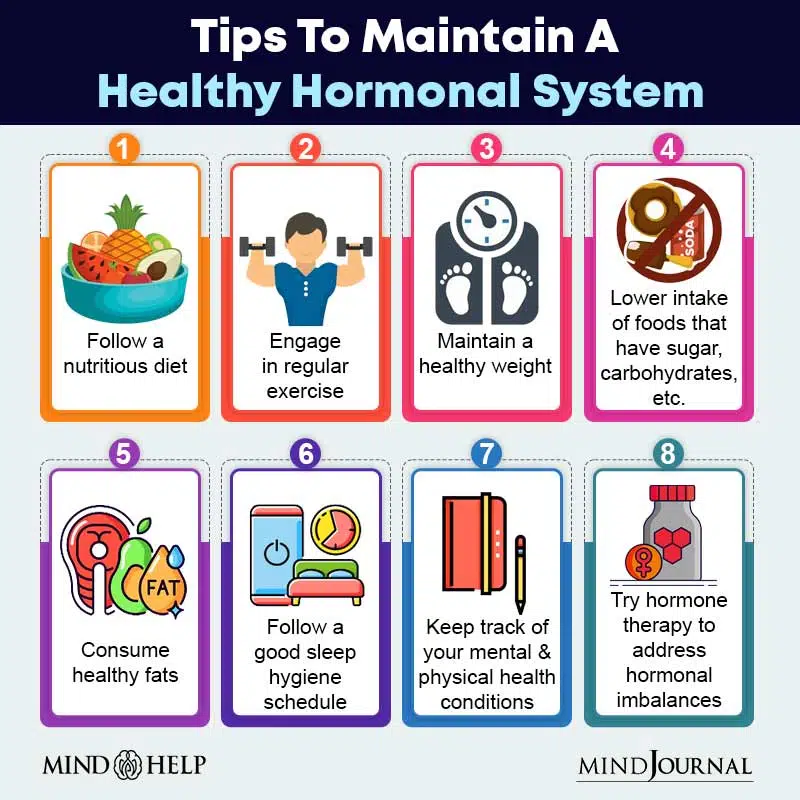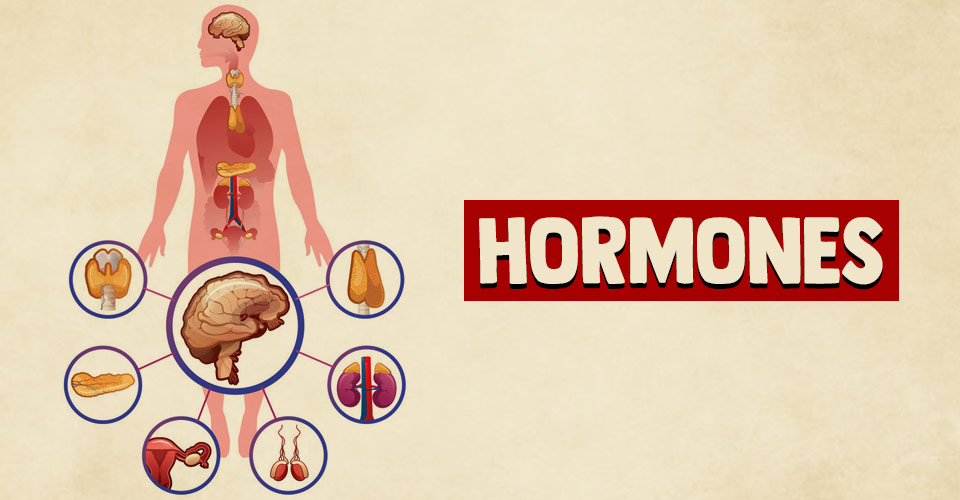Hormones are signaling chemicals that control basic body functions related to metabolism, growth, and sexual development. These are secreted by the endocrine system.
What Are Hormones?
Hormones are chemical signaling molecules that are circulated through biological processes to regulate physiology and behavior in the body. The word is derived from the Greek word hormao meaning “I excite or arouse”. These chemicals communicate these effects by their unique chemical properties that work on certain cells and tissues. Different hormonal signaling aids different physiological processes in the body.
Hormones are produced in the endocrine system and other tissues. These are then carried via blood to their target cells located across tissues and organs. Some hormones have specific target cells, whereas others affect numerous cell types throughout the body.
Different tissue types may also respond differently to the same hormonal signal 1 Nussey S, Whitehead S. Endocrinology: An Integrated Approach. Oxford: BIOS Scientific Publishers; 2001. Chapter 1, Principles of endocrinology. Available from: https://www.ncbi.nlm.nih.gov/books/NBK20/ .
Hormones also have their patterns of secretion and concentrations in the general or localized circulation of organic body-chemicals. The target cells of each hormone have certain ‘docking’ molecules called “receptors”. The hormones bind themselves to the receptors and the interaction triggers “a cascade of biochemical reactions in the target cell that eventually modify the cell’s function or activity”.
Hormones aid the intricate biological processes in our body and bring about a diverse range of systemic physiological effects 2 McLaughlin MB, Jialal I. Biochemistry, Hormones. [Updated 2021 Jul 22]. In: StatPearls [Internet]. Treasure Island (FL): StatPearls Publishing; 2022 Jan-. Available from: https://www.ncbi.nlm.nih.gov/books/NBK541112/ .
These effects are closely related to metabolism, growth and development, reproduction, emotional regulation, appetite, digestion, etc. Because of this, even the slightest dysfunction and imbalance in our hormonal environment can severely impact our physical and mental health.
Therefore, we should take good care of our hormonal system through proper nutrition, exercise, and sleep. In case of difficulties, one can seek medical help in the form of hormone therapy.
Read More About Sleep Here
What Is The Endocrine System?
One 1998 study 3 National Center for Biotechnology Information (US). Genes and Disease [Internet]. Bethesda (MD): National Center for Biotechnology Information (US); 1998-. Glands and Hormones. Available from: https://www.ncbi.nlm.nih.gov/books/NBK22231/ defines the endocrine system as “a complex collection of hormone-producing glands that control basic body functions such as metabolism, growth and sexual development”. It consists of the following glands:
- Hypothalamus
- Pituitary gland
- Pineal gland
- Thyroid
- Parathyroid glands
- Adrenal glands
- Pancreas
- Ovaries
- Testes
However, the hormones produced in the human body are not restricted to the endocrine glands and the hormones secreted by certain other body tissues also contribute to human physiologic processes. This additional mechanism is referred to as the “diffuse” endocrine system and includes:
- Adipose tissue
- Kidneys
- Liver
- Gut (gastrointestinal tract)
- Placenta
- Myocytes in the atria of the heart
- Scattered epithelial cells in the stomach
What Are The Types Of Hormones?
A plethora of hormones regulates the most fundamental bodily functions related to metabolism, growth and development, reproduction, and electrolyte balances.
A 1998 study 4 Hiller-Sturmhöfel, S., & Bartke, A. (1998). The endocrine system: an overview. Alcohol health and research world, 22(3), 153–164. elaborates that “Many of these hormones are involved in regulatory hormonal cascades that include a hypothalamic hormone, one or more pituitary hormones, and one or more target gland hormones.”
Given below is a list of important hormones which are associated with the human body, including:
1. Amino acid-derived Hormones
Amino acids are building blocks of proteins. The amino acid-derived hormones are derived from tyrosine and tryptophan and are usually produced in the adrenal medulla and the pineal gland.
This category of hormones are mostly neurotransmitters and includes:
- Epinephrine
- Norepinephrine
- Thyroxine
2. Eicosanoids
Eicosanoids are signaling molecules that are made by the enzymatic or non-enzymatic oxidation of arachidonic acid or other polyunsaturated fatty acids. These are mostly hormones that send messages near the cell that produces the hormones.
Examples of these hormones include:
- Prostaglandins (PG)
- Thromboxanes (TX)
- Leukotrienes (LT)
- Lipoxins (LX)
3. Peptides, Polypeptides, And Proteins
Peptides, polypeptides, and proteins are bioidentical hormones that comprise complex chains of amino acids produced in the brain and released in the bloodstream. Its examples include:
- Antidiuretic hormone
- Oxytocin
- Growth hormone
- Large glycoproteins
- Follicle-stimulating hormone
- Insulin
4. Steroid Hormones
Steroid hormones are cholesterol steroids that act as hormones. They belong to 2 classes and are of 5 types, including:
- Corticosteroids, comprising glucocorticoids and mineralocorticoids, are secreted by the adrenal cortex
- Sex steroids, comprising androgens, estrogens, and progestogens, are secreted by the gonads or placenta
What Are The Important Functions Of Hormones?

Hormones control fundamental bodily processes related to:
- Homeostasis
- Circadian clock
- Blood circulation
- Appetite and digestion
- Growth and development
- Sexual desire and reproduction
- Electrolyte balance
- Body temperature
- Moods and emotions
Read More About Appetite Here
What Causes Hormonal Imbalances?
Hormonal imbalances occur when there is either too much or too little of a hormone in the bloodstream. It is caused by a number of factors, depending on which hormones or glands are affected. These include:
- A problem with the endocrine feedback system
- Delay in gland stimulation to produce a particular hormone
- Puberty 5 Brucker-Davis, F., Thayer, K., & Colborn, T. (2001). Significant effects of mild endogenous hormonal changes in humans: considerations for low-dose testing. Environmental health perspectives, 109 Suppl 1(Suppl 1), 21–26. https://doi.org/10.1289/ehp.01109s121
- Stress 6 Ranabir, S., & Reetu, K. (2011). Stress and hormones. Indian journal of endocrinology and metabolism, 15(1), 18–22. https://doi.org/10.4103/2230-8210.77573
- Injury or trauma 7 VandeVord, P. J., Sajja, V. S., Ereifej, E., Hermundstad, A., Mao, S., & Hadden, T. J. (2016). Chronic Hormonal Imbalance and Adipose Redistribution Is Associated with Hypothalamic Neuropathology following Blast Exposure. Journal of neurotrauma, 33(1), 82–88. https://doi.org/10.1089/neu.2014.3786
- Medications, like birth-control pills, height growth pills, etc.
- Treatment processes like steroid usage, chemotherapy, etc.
- Genetic disorders like multiple endocrine neoplasias (MEN), congenital hypothyroidism, etc.
- Chronic illnesses, like tumors, cancer, PCOS, etc.
- Lifestyle choices
- Reproduction-related processes like menstruation, menopause, pregnancy, etc.
- Health conditions like malnutrition, etc.
- Mental disorders, like eating disorders, sleep disorders, stress disorders, etc.
Read More About Eating Disorders Here
What Is The Link Between Hormones And Diseases?
Chronic dysfunction in the endocrine system and related issues can lead to a disruption of hormone levels on a long-term basis and interrupt our everyday normal functioning. Hormonal imbalances negatively impact our physical and mental wellbeing, so far so that they become markers of more serious underlying health conditions.
For instance, according to one 2014 study 8 Yu J. (2014). Endocrine disorders and the neurologic manifestations. Annals of pediatric endocrinology & metabolism, 19(4), 184–190. https://doi.org/10.6065/apem.2014.19.4.184 , because the nervous system and the endocrine system are closely interrelated, “endocrine dysfunctions may lead to various neurologic manifestations such as headache, myopathy, and acute encephalopathy including coma”.
Symptoms Of Hormonal Imbalances

These symptoms of hormonal imbalance vary in men, women, and children, but some signs are generic expressions of slight or harmless hormonal changes.
- Unexplained weight gain or loss
- Fatigue
- Headaches and migraines
- Muscle weakness and pain
- Abnormal hair growth
- Constipation
- Frequent urination
- Infertility
- Impaired growth and development
- Thinning hair
- Dry skin
- Puffy or rounded face
- Decreased sex drive
- Increased hunger and thirst
- Irritability, anxiety, nervousness, etc.
- Blurred vision
- Sleeping problems disrupted sleep, etc.
- Mental health conditions
Read More About Anxiety Here
Hormonal Diseases
Endocrine disorders are quite complex and they often involve dysfunction in the feedback mechanisms involved in the endocrine system or delay in gland stimulation in producing a particular hormone. Broadly, hormonal diseases can be subdivided into three groups, namely,
- Endocrine gland hypofunction or hyposecretion
- Endocrine gland hyperfunction or hypersecretion
- Tumors of endocrine glands
The most common types of hormonal diseases include:
1. Hypothalamic-pituitary Dysfunction
Various hypothalamic-pituitary lesions lead to cysts, cell tumors, abnormal body mass index, or decreased growth velocity.
Common disorders resulting from hypothalamic-pituitary dysfunction include:
- Huntington’s disease (HD)
- Pubertal disorders
- ACTH deficiency
- Diabetes insipidus
- Central hypothyroidism
- Elevated prolactin
2. Thyroid Disorders
Thyroid disorders, according to one 2014 study, manifest in “mental retardation, hypotonia, constipation, somnolence, apnea, large fontanels, and sensorineural hearing loss”. Other symptoms include developmental delay, psychosis, seizures, ataxia, and coma.
The most common Thyroid disorders include:
- Congenital hypothyroidism
- Kocher-Debre-Semelaigne syndrome
- Hashimoto’s encephalopathy
- Grave’s disease
3. Parathyroid Disorders
According to one 2014 study, “neurologic manifestations associated with parathyroid disorders are related with serum calcium levels”. Such disorders result in cramps, numbness, muscular pain, apnea, seizures, headaches, vomiting, weight loss, severe central nervous system, and metabolic derangement.
The most common types of parathyroid disorders include:
- Hypoparathyroidism
- Hyperparathyroidism
- Autoimmune polyendocrine syndrome type 1 (APS1)
4. Adrenal Disorders
The symptoms of adrenal insufficiency include “fatigue, muscle weakness, anorexia, nausea, vomiting, diarrhea, hypotension, weight loss, headache, and skin hyperpigmentation” and get manifested in disorders like:
- Adrenal hemorrhage
- IMAGe (intrauterine growth restriction, metaphyseal dysplasia, adrenal hypoplasia congenital, and genital anomalies) syndrome
- Hypotension
- Cushing syndrome
5. Diabetes Mellitus
Too little or too much insulin secretion causes diabetes. Its manifestations include agitation, confusion, lethargy, headache, and vomiting. The more severe cases of this disorder include neurologic manifestations such as –
- Tremors
- Confusion
- Behavioral changes
- Blurred vision
- Seizure
- Coma
How To Balance Hormones

Our bodies are naturally inclined to produce hormones in the ‘right’ quantities to facilitate the processes that keep us healthy. However, our sedentary lifestyles, poor dietary patterns, advancing years, and health conditions also influence our hormonal environments. In such cases, our hormonal system needs a ‘little help’ to function properly.
Consider the following tips to balance your hormones:
- Follow a nutritious diet
- Engage in regular exercise
- Maintain a healthy weight
- Lower intake of foods that have sugar, carbohydrates, etc.
- Consume healthy fats
- Follow a good sleep hygiene schedule
- Keep track of your mental and physical health conditions
- Try hormone therapy 9 Harper-Harrison G, Shanahan MM. Hormone Replacement Therapy. [Updated 2022 Feb 17]. In: StatPearls [Internet]. Treasure Island (FL): StatPearls Publishing; 2022 Jan-. Available from: https://www.ncbi.nlm.nih.gov/books/NBK493191/ to address hormonal imbalances
Takeaway
A healthy hormonal environment is central to our good health and everyday functioning. Therefore, we should take good care of our hormonal system via hygienic practices, physical activities, therapy, and medication.
Hormones At A Glance
- Hormones are chemical signaling molecules that aid various bodily functions.
- Hormones are secreted by the endocrine glands and other tissues in the kidneys, stomach, etc.
- These regulate homeostasis, the circadian rhythm, blood circulation, appetite, sexual desire, moods, emotions, etc.
- Hormonal imbalances impact our physical and mental health and disrupt our everyday functioning.
- We can easily maintain a healthy hormonal environment with adequate nutrition, exercise, quality sleep, etc.
- Hormonal imbalances can also be addressed by hormone therapy.
Frequently Asked Questions (FAQs)
1. Why are hormones so important?
Hormones are fundamental to all systems of the body related to growth and development, metabolism, mood, blood circulation, reproduction, body temperature, appetite, etc. That is why it is important to maintain optimal hormonal balance.
2. What happens if you have no hormones?
Without hormones, the fundamental bodily functions like appetite, sleep, growth, sexual desire, metabolism, etc. get disrupted. This severely impacts our day-to-day functioning, as well as our mental and physical health.
3. How many hormones are in the human body?
Over 50 types of hormones have been identified in humans and other vertebrates.
4. What kind of doctor treats hormone-related conditions?
An endocrinologist is a medical professional who treats hormone-related conditions.
5. How are hormones used in mental health care?
Disorders surrounding reproductive hormones and stress hormones can cause mental health symptoms. Hormone therapy, specifically hormone replacement therapy, is used to treat mental disorders related to stress or sexual health like PTSD, menopause, post-partum depression, etc.











